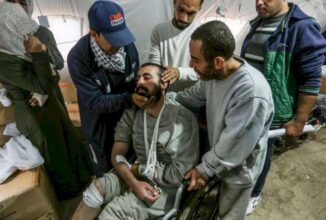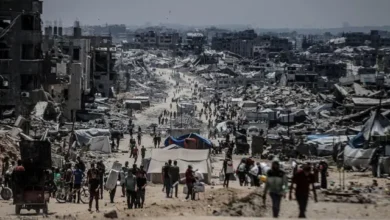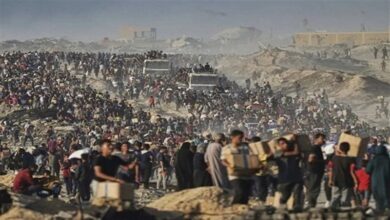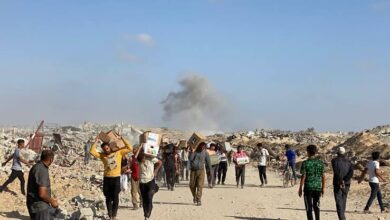
Abdel Ati Sends Briefing Note and Urgent Appeal for Immediate International Humanitarian Action to Ensure the Entry of Humanitarian Aid to Gaza’s Population and to Stop the Ongoing Genocidal War and Collective Punishment
Date: April 19, 2025
Press Release
Abdel Ati Sends Briefing Note and Urgent Appeal for Immediate International Humanitarian Action to Ensure the Entry of Humanitarian Aid to Gaza’s Population and to Stop the Ongoing Genocidal War and Collective Punishment
Immediate international humanitarian intervention is no longer a mere option—it has become a legal and moral obligation that cannot be delayed, in light of the spread of famine and disease and the collapse of humanitarian conditions that now threaten the lives of Gaza Strip residents.
The continued scandalous international silence and inability to stop the Israeli ban on the entry of humanitarian aid for more than 45 days constitutes complicity in the crime of genocide being committed against more than two million people in the Gaza Strip, who are living in catastrophic conditions that threaten their lives and human dignity.
In this context, Mr. Abdel Ati, Chairman of the International Commission to Support the Palestinian People’s Rights “ICSPR,” sent a briefing note and an urgent humanitarian appeal to the international community and its institutions, calling for immediate and urgent action to ensure the entry of humanitarian aid into the Gaza Strip and to stop the ongoing Israeli crimes and violations committed by the occupation forces, which amount to genocide and collective punishment.
The briefing note was sent to the Secretary-General of the United Nations, the High Commissioner for Human Rights, the Prosecutor of the International Criminal Court, the Secretary-General of the Arab League, the Secretary-General of the Organization of Islamic Cooperation, the European Union Special Representative for Human Rights, the President of the Inter-Parliamentary Union, the President of the International Committee of the Red Cross, and a number of special rapporteurs and human rights experts at the United Nations, in addition to a group of relevant international organizations and institutions.
The Commission also addressed a group of ambassadors from influential countries in the region, calling on them to assume their legal and humanitarian responsibilities regarding the crimes of genocide, systematic starvation, and forced displacement being committed against the population of the Gaza Strip.
Alarming Figures and Statistics Indicate an Unprecedented Humanitarian Catastrophe
According to the memorandum, the humanitarian situation in the Gaza Strip is witnessing a comprehensive collapse due to the prevention of the entry of food, medicine, water, and fuel amid the continuation of the comprehensive Israeli aggression. The following indicators reveal the depth of the catastrophe:
-
Famine is imminent in the Gaza Strip after 45 days of complete siege, necessitating urgent international action to prevent its spread.
-
There are alarming indicators confirming that the population has entered a phase of acute food insecurity, which is on the verge of turning into widespread famine due to the severe shortage of essential food needed to survive.
-
The occupation has systematically worked in recent weeks to disable and destroy what remains of the agricultural and food infrastructure.
-
A large number of residents were forced to sell their basic possessions to secure food, indicating the beginning of the collapse of their coping mechanisms.
-
Fresh and frozen meats and bread are completely missing from the Strip’s markets, and vegetables are available only in very limited quantities and at exorbitant prices that most residents cannot afford.
-
It is estimated that daily deaths are occurring due to food shortages and weakened immunity amid the continued Israeli blockade, the prevention of aid entry, and the destruction of health and environmental infrastructure.
-
The systematic starvation crime being committed against civilians in Gaza represents one of the most horrific forms of genocide and one of the most cruel and dehumanizing violations.
-
More than one million children in the Gaza Strip suffer from acute malnutrition amid food insecurity and the total collapse of the health system.
The memorandum confirmed that the Israeli occupation is committing the crime of genocide through the prevention of aid entry for 46 days, the destruction of health institutions and humanitarian facilities and infrastructure, the denial of services, restrictions on freedom of movement, the targeting of civilians, and the imposition of collective punishment.
First: Undermining and Systematic Targeting of Humanitarian Institutions
Humanitarian institutions, foremost among them the United Nations Relief and Works Agency for Palestine Refugees (UNRWA), have been subjected to a wide-scale attack, including:
-
A systematic campaign to delegitimize it, which led to the suspension of its funding by more than 16 countries since January 2024, thereby halting its services to approximately 1.7 million refugees, obstructing the distribution of food, medical, and educational supplies, and allowing non-neutral parties, including military entities or those affiliated with the occupation, to manage the aid.
-
The targeting of more than 160 humanitarian institution headquarters by missiles or forced evacuation orders, in direct violation of international humanitarian law.
-
Non-governmental organizations have been prevented from operating freely, being required to coordinate with occupation authorities and re-obtain work permits in the occupied Palestinian territories, in addition to submitting lists of employee names for security vetting, with some rejected due to any form of solidarity with Palestinians. Furthermore, a series of restrictions undermines the independence of their work and prevents the delivery of impartial aid.
Second: The “Five Fingers” Plan and the Geographic Fragmentation of the Gaza Strip
This plan aims to divide the Gaza Strip into five separate areas (Rafah, Khan Younis, Deir al-Balah, Gaza City, and North Gaza), which leads to:
-
Isolating residents into closed enclaves under suffocating security conditions.
-
Distributing aid selectively through private security companies based on political considerations rather than humanitarian needs.
-
Difficulty in delivering relief to northern areas of Gaza, whose infrastructure has been completely destroyed.
-
A complete siege for over 46 days, with signs of severe famine and the disappearance of food, medicine, and medical supplies.
-
Preventing any attempt to restore geographic connectivity between parts of the Strip, turning them into collective prisons under bombardment, including areas declared by the occupation as humanitarian zones.
Third: The Catastrophic Consequences of Blocking Humanitarian Aid Entry
The prevention of the entry of essential relief supplies has led to:
-
85% of the population losing access to basic food sources due to the closure of bakeries, soup kitchens, and aid supply chains.
-
Empty markets devoid of basic food commodities.
-
Dozens of bakeries shut down due to fuel shortages.
-
Near-total suspension of kitchens and health centers due to a lack of cooking gas and fuel.
-
Paralysis in vital sectors linked to energy, water, and health.
The occupation deliberately used starvation, thirst, and environmental pollution as weapons of war against Palestinians by turning areas hosting over 1.9 million displaced persons into open-air landfills, where people now live surrounded by mountains of waste, some dying daily in such conditions.
Fourth: Seizure of Humanitarian Aid and Its Use as a Tool for Political Blackmail
Israeli military operations and restrictions have led to an almost complete paralysis of the aid distribution system. Data from the World Food Programme (WFP) and the United Nations indicate that more than 2.2 million people in Gaza suffer from food insecurity, while less than 10% of the needed aid has been allowed in since the beginning of the aggression. UN reports indicate that the Israeli occupation:
-
Seized aid shipments, destroyed some of them, or obstructed their entry, and determined the type of aid and goods allowed in, thereby preventing the entry of medical equipment, temporary housing, tents, medicines, and a large number of essential civilian needs.
-
Turned aid into a weapon of war against civilians and a tool of pressure and dominance, in blatant violation of the Geneva Conventions, the Convention on the Prevention of the Crime of Genocide, the Rome Statute, and human rights standards.
Fifth: Forced Displacement, Imposed Hunger and Thirst, and the Spread of Diseases
More than 90% of the population in the Gaza Strip has been forcibly and repeatedly displaced, suffering from severe hunger and a lack of tents and shelters, with some families exposed to the risk of death due to indiscriminate bombing and the targeting of shelters and displaced persons’ tents. Moreover, 80% of them face difficulty accessing drinking water or sufficient food.
-
The destruction of more than 88% of homes prevents the return of internally displaced persons and the destruction of infrastructure and service facilities, especially health services.
-
Electricity cuts and prevention of fuel entry needed to operate hospital generators, water desalination plants, and sewage systems.
-
Destruction of water wells and desalination plants, targeting of water pipelines, cutting off water supply by the Israeli Mekorot company, and targeting of solar panels used to operate water and service facilities.
-
Preventing the removal of garbage and solid waste, leading to the spread of mosquitoes and flies and the outbreak of diseases and epidemics.
-
Preventing and reducing aid to the lowest level and turning the Gaza Strip into a disaster area unfit for life—these are objectives pursued by the Israeli occupation forces as part of the genocidal generals’ plan, with the ultimate aim of forcibly displacing the population of Gaza outside the occupied Palestinian territories.
The memorandum stressed that the occupation prevents the entry of humanitarian aid including food, medicine, water, and fuel, which has caused a compounded and unprecedented humanitarian disaster. It also documented that the Israeli occupation killed several humanitarian workers, including international aid workers, which disrupted the operations of local and international relief organizations, including UNRWA, further exacerbating the crisis.
Urgent Calls and Required Steps
In light of all the above, the International Commission “ICSPR” called in its memorandum for:
-
Urgent action to open all humanitarian crossings and ensure the unrestricted flow of aid.
-
Sending international and independent investigative missions to probe genocide crimes and systematic starvation.
-
Holding Israeli officials accountable before the International Criminal Court for the crimes committed.
-
Pressuring governments and international parties to halt their political and military support for the occupation.
-
Strengthening protection mechanisms for civilians, especially women, children, and the elderly, amid the ongoing aggression.
-
Urgent action to stop the war, crimes, and collective punishment imposed on the population.
Conclusion
The International Commission “ICSPR” affirmed that the situation in the Gaza Strip cannot bear further delay or political maneuvering, and that international silence on the crimes committed constitutes complicity with the occupation in perpetrating the crime of genocide.
It called for the broadest campaign of solidarity and legal and popular action to save what remains of life in Gaza and to hold war criminals accountable for their grave violations of international humanitarian law.





